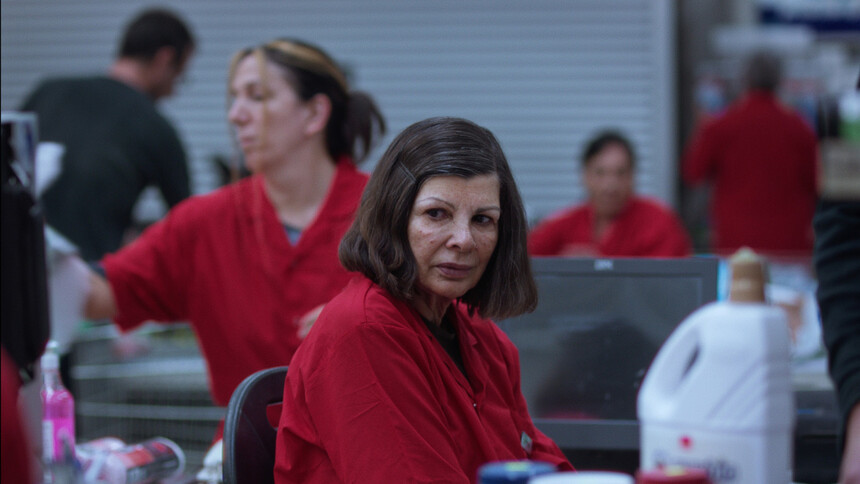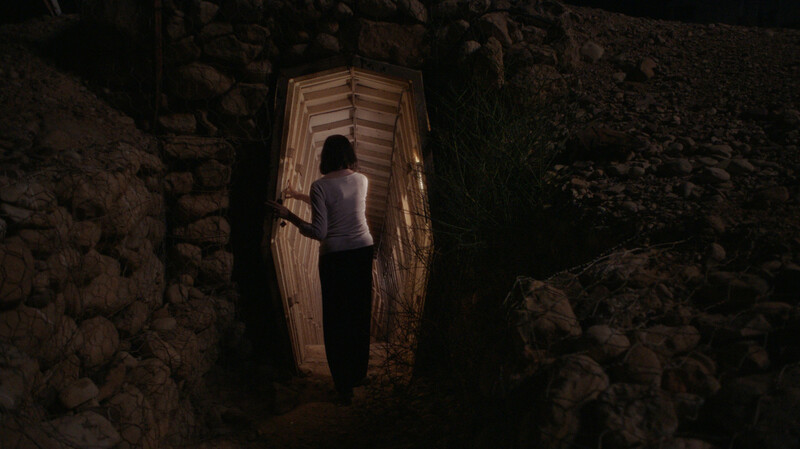Karlovy Vary 2024 Review: TROPICANA, A Middle Age Coming of Age With Seidlian Touch

In the arid expanse of the Israeli desert, a weary supermarket cashier’s life in a small town takes an unexpected turn. Omer Tobi’s debut feature film, Tropicana, centers on Orly Balaish (Irit Sheleg), a middle-aged woman whose existence is defined by monotonous routine and the burden of caretaking. The sudden murder of a colleague thrusts her into new responsibilities and unveils hidden aspects of the deceased's life. This event propels Orly on a journey of self-discovery, unearthing her repressed desires and longing for human connection.
Tobi, an emerging filmmaker with a background in exploring queer and ethnic identity, carries his thematic interests from his shorts into Tropicana. Here, he delves into themes of desire, lust, and the ramifications of their absence. The film scrutinizes the protagonist’s circumstances, which are framed by isolation and emotional desolation.
Orly's life, marked by a ceaseless cycle of supermarket shifts and domestic chores, starkly illustrates her alienation. Tobi’s minimalistic storytelling style amplifies this sense of desolation. The narrative takes a sudden turn with the death of Sigal (Regina Spector), the supermarket’s head cashier, compelling Orly to step out of her comfort zone both professionally and personally. This event probes the repressed aspects of her identity. The discovery of Sigal’s secret life through a ringing cell phone sparks Orly’s transformation. Tobi uses the turning point to explore themes of identity and desire, highlighting the protagonist’s awakening beyond the confines of her established roles.
One of the prevailing trends on the festival circuit is films about female awakening, where women, in their middle age, begin new and emancipating journeys from the confines of their lives—be it gender, social, familial, or sexual. Tobi’s feature debut fits into this category, but what sets Tropicana apart is its formalism. The film's austere aesthetics, fixed shots, limited number of longer scenes, and minimalist approach contribute to an otherworldly atmosphere as the protagonist delves into an underground world of sexual exploration.
Ulrich Seidl’s 2001 Dog Days came to mind, especielly the early orgy scenee, when watching Tropicana. However, Tobi does not venture into graphic or shocking territory. Instead, he uses non-conventional sexuality as a transgressive rite of passage. Seidl’s aesthetics seem to significantly influence Tropicana's mise-en-scène, with sparse dialogue, a subdued color palette, and careful composition. Although Tobi does not attempt to mimic documentary poetics, the drama is more stylized, setting it apart from typical social and psychological dramas, despite Tropicana fundamentally being an enigmstic psychological drama.
The film begins with a crime and the discovery of a sex burner phone, prompting Orly, who is mostly confined to her home caring for a whimsical, bed-ridden mother and enduring a sexless, affectionless marriage, to seek new experiences. She explores freedom through carnal encounters. Tobi's portrayal is nuanced and grounded in reality. He avoids orchestrating any corporeal spectacles, sparing viewers from shocking effects, and focuses more on the awkwardness of the encounters.
Tropicana's main motifs are loneliness, desire, and being misunderstood, framing the film as an outsider drama. However, its deliberate pacing, the shrouding of unknown mysteries, and the introspective nature make the film less plot-driven, focusing instead on a carefully curated set of scenes. While some actions are foreshadowed, Tropicana resists shifting toward a more plot-driven narrative, maintaining a sense of opacity.
Consequently, the 82-minute film can feel like an extended exposition, lacking substantial narrative progression. Despite this, Tobi preserves a deadpan, slightly Seidlian humor, and an Austrian filmmaker’s penchant for voyeurism. This results in a dramedy that detaches itself from conventional narratives about middle-aged small-town women finding newfound freedom and breaking through societal or self-imposed barriers.








